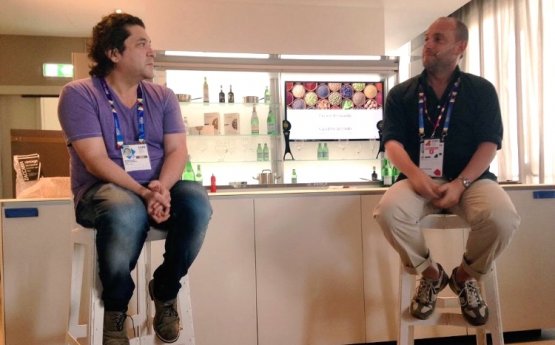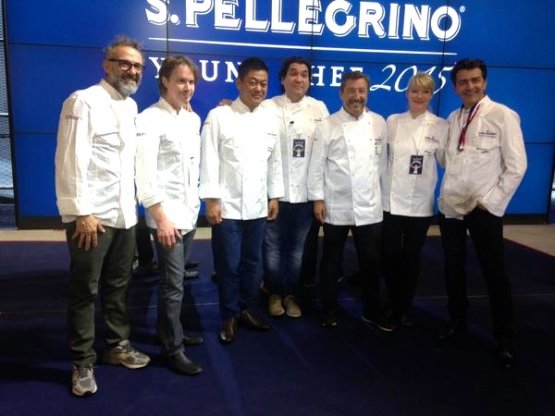«Food is the most powerful weapon of peace» says Gastón Acurio at Identità Expo in front of an audience enchanted by his words. The same words that also charmed Mario Vargas Llosa, Nobel prize for literature in 2010, captured by the dream of this chef-leader who changed his country and promises he’ll change our own a little too: «We live in a country with many limits and faults. Yet in the hands of this man, our cooking becomes one of the richest in the world. No one has done so much for Peru as Gastón Acurio».
During the interview he says: «Our country is the country of (bio)diversity. We focus on our cuisine not just so that people can taste our dishes but also so that they can understand the culture on which these dishes are based. Peru is a multicultural country, which found it common point in food, its identity flag. We wanted people to know what had been simmering in our houses forever, but appeared to us to have no dignity. We resisted the contradiction of an extremely rich country where there is plenty of poor people. And we didn’t want to accept the idea that our country had nothing good in it. We put together refined cooks and street food cooks as well. We had very good professionals before too, but they were overcome by European ones because they were used to follow the rules of foreign cuisine».

The meeting last Thursday at Identità Expo: Acurio interviewed by Carlo Passera, reporting for Identità Golose
«Exactly. We were always fully booked, but it made no sense. So we changed and tried others to change their mind too. When we suggested that Peruvian chefs should cook the tradition of their land, we faced some opposition. We had to work hard to conquer their trust, because our community is based on trust».
Why did you want chefs to join forces with farmers?
«This is our main point. We have 2 million farmers who have never been represented whereas now we support them. This is why we wanted to create a movement that had chefs as their allies. Of course they were sceptical too at first: in the last 300 years the government always approached them with plenty of promises that were never fulfilled».
What are your “promises” instead?
«Farmers are under-represented and poor yet the have preserved a huge heritage: they kept on producing lots of food that had no place in the market but was used in their kitchens, they were the basis for their – and our – culture. When we first approached them, they were sceptical. Then we started to understand each other. Can I tell an anecdote?».
Of course.
«In order to enhance our biodiversity and have chefs and farmers meet, eight years ago we created Mistura. We started by bringing farmers to Lima, we won their opposition. Today Mistura is the meeting point for thousands of them, who are all very proud to be part of a responsible community. I recall the words of a farmer, whom we applauded as the best producer of quinoa, a plant that no one wanted to buy in the past: “We’ve been waiting for this prize for 400 years”. We want to give people like him a voice».

Acurio, in the middle, among the colleagues who were also part of the jury of the San Pellegrino Young Chef award
«I was criticised, indeed, just like
Bottura or
Adrià were also criticised. Some people would like us to stay always and only in the kitchen, not in the countryside, talking to farmers. Instead, I want to discuss with them, understand how the product they farm is born. This also helps me to do a better job in the kitchen, it is easier to enhance raw materials then, and dishes have more depth because they have a precise story behind them, which the chef knows and is able to tell. A dish does not include just material ingredients but also spiritual ones, it is soul food. It thus has a different, better taste. We didn’t invent anything, neither ingredients nor recipes. We just gave value to what was already available. However you cannot respect a product if you don’t respect its producer. We want to change market rules so that trade is fairer».
It’s an ambitious project that implies a change of perspective, and not just in Peru. Do you think it’s realistic?
«We started in Peru but today our movement involves Latin America and I’d say the world too. Chefs need to understand they are not stars but part of a complex system in which they are privileged, because they have the opportunity to convince people to change their diet in favour of more sustainable and healthy food. We can face this battle from many different points of view: environmental, social and so on. We must understand that we are very lucky and we have a unique opportunity. We exist only because farmers exist, we should never forget this. We need to be their voice, we will never stop until they will have the same social recognition we have».
You want to use Peruvian restaurants as “embassies” for your country and philosophy. How does it work?
«We want a Peruvian restaurant in every important city in the world, to spread our culture and message. But when we open a place in California, for instance, we tell our chef he needs to use three Peruvian ingredients and all the others must be sourced locally, because we want to create a relationship the territory. We want to create roots and integration, we want to join forces».
Has the relationship with the earth changed in your Peru?
«It has changed very much. We were the last in South America, today we have an incredible agricultural development. We are not the best, we have just grown. The result of our work is that today children respect nature. We are not against science but we want to give value to the gifts the environment gives us, in order to safeguard a balanced development. I’ll tell you another anecdote: multinational Monsanto wanted to introduce non-autochthon soy and corn in our country. Their representatives visited a farmer. He listened to them and replied: “These seeds of yours have a greater yield than my blue corn, I will thus be able to earn more. However, what will I do with the money? I will use it to go to the market and buy what makes me feel good, what is part of my culture, an ingredient for my recipes, that is to say blue corn. So I might just as well keep on producing it myself "».
To finish, Acurio, your argument is very “political”. Have you any ambitions in that field too?
«I have a beautiful job, being a politician is instead horrible, why should I change? I want to influence politics, though. That is true».